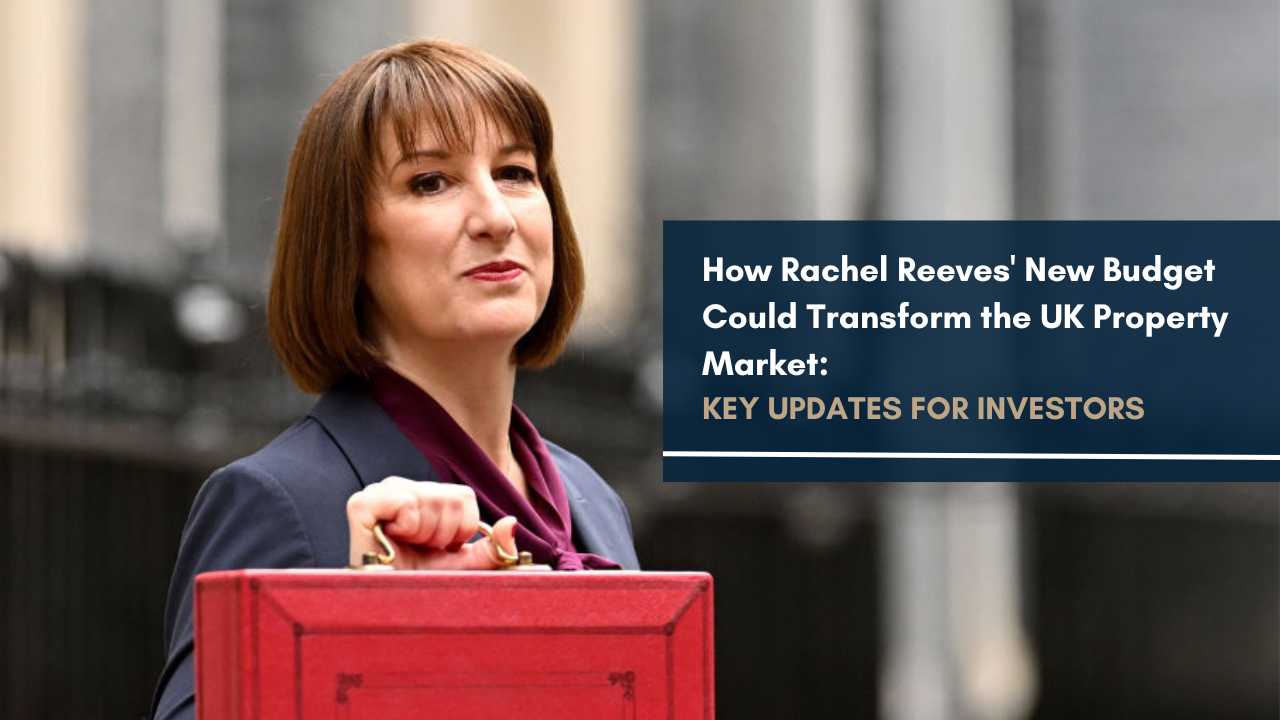Overseas investors in UK property love the long-term stability, transparency, and investor protection that the market offers – with world-class yields and growth.
Major cities like London, Manchester and Birmingham have attracted foreign investment for many years, while other locations are undervalued – offering amazing options for property investors.
The country’s resilient economy and thriving student population keep rental demand high, while landlords have historically benefited from strong capital appreciation over time.
According to the Centre for Public Data (CFPD), foreign ownership of UK residential property has more than doubled over the past decade – a rise of 180% to be exact – and the demand shows no signs of slowing anytime soon.
If you’re considering purchasing an investment property in the UK, this guide will walk you through the main considerations and challenges that need to be addressed before making the move.
The Tax & Legal Landscape
The UK’s open market policy means that any individual or company has the right to purchase property, and there are no specific restrictions for foreign nationals.
Overseas buyers still need to navigate legal complexities to avoid breaking laws and making costly mistakes when purchasing UK property – here are a few key points to consider.
Which structure is right for you?
If you intend to purchase a UK investment property and earn income through rent, you need to establish what type of legal entity is the right fit for your current situation and long-term objectives.
Common options include:
- Buying as an individual – When buying as an individual, the buyer is the sole owner of the property and will have full control over its ownership and use. If renting out the property, they will typically be required to pay Income Tax on rental income; and Capital Gains Tax when selling the property.
- Setting up a limited company – Instead of purchasing as an individual, an investor could choose to set up a limited liability company as a vehicle through which to invest in property. Although this structure often requires additional administration, filing and management of Corporation Tax, a limited company can work out to be more cost-effective, especially if your rental income exceeds a certain threshold.
- Purchasing through a trust – Creating a trust is another common option for overseas investors, giving them exposure to the UK property market without having direct ownership of a property. There are also many Real Estate Investment Trust (REIT) options available to foreign buyers which offer dividends and a range of tax advantages.
Each structure has its own legal implications and tax liabilities, so it’s crucial to seek professional advice to choose the most suitable option for you.
Understanding taxes on UK property
Your choice of business structure will determine the type of taxes you will be liable to pay. These are the most common taxes associated with buying and selling UK property:
Stamp Duty Land Tax (SDLT)
Stamp Duty is a tax payable on the purchase of residential and commercial properties in the UK. Overseas investors are subject to SDLT at the same rates as UK residents, plus an additional 2% surcharge on top of the standard rate. The exact rates depend on the property’s value and the number of investment properties you own; however, you may be eligible for exemptions or reliefs based on specific circumstances. Learn more about SDLT.
Corporation Tax or Income Tax
Depending on their business structure, non-UK resident landlords will be required to pay either Corporation Tax or Income Tax on any rental income earned from their property. All landlords are required to submit a tax return or self-assessment to HMRC which details their rental income, expenses and profits. Non-UK residents are not eligible to benefit from the UK’s current tax-free personal allowance of £12,570. In some cases, letting agents may be required to withhold 20% of income tax from rental income and then pay tax directly to HMRC on behalf of non-UK resident landlords.
Capital Gains Tax (CGT)
UK property owners are due to pay Capital Gains Tax whenever they sell a property for a profit. This is calculated as the difference between the property’s sale price and its original purchase price. It’s important to be aware that non-UK resident landlords are subject to specific rates of CGT on UK property sales, and also need to report and pay CGT within 30 days of selling a property. The current flat rate is 28% on any profit made following the sale of the property.
Inheritance Tax
Inheritance Tax is the tax paid on a person’s estate when they die, and it applies to both UK residents and non-UK residents who have assets in the UK. However, this only applies if the value of the person’s estate (including their property) is over £325,000.
In all cases, non-UK resident landlords may be eligible for double taxation relief if there is a tax treaty between the UK and their home country. This ensures that the same property is not taxed twice in both countries.
For more information, check out our guide to buy-to-let taxes.
Can property ownership lead to UK citizenship or residency?
No – property ownership alone does not automatically grant UK citizenship or the right to residency for overseas nationals.
However, high-net-worth individuals may be able to apply for an ‘Investor Visa’ if they plan to make a substantial investment in the UK. They may also apply for an ‘Entrepreneur Visa’ if they plan to relocate to the UK to start a business, with property investment being one component of that plan.
The rules around obtaining UK residency or citizenship are complex, so it’s worth discussing your plans with a professional immigration advisor to establish the best route forward for you.
Financing your property investment
Cash investment
Paying in cash is by far the quickest and easiest way to purchase a property in the UK. This avoids any need to involve mortgage brokers and lenders and effectively gives the buyer immediate ownership over their new property.
Mortgages
Overseas investors have several options when financing a property with a mortgage. There are a number of specialist banks and lenders that cater to this need through international mortgages. Certain UK banks may also grant mortgages and buy-to-let mortgages, though the options are more limited compared with those available to UK residents, and the buyer may be required to put down a larger deposit. Terms and interest rates vary so research will be required to find the best available mortgage for your situation.
Developer financing
Depending on the type of UK property investment you intend on pursuing, you may be able to access funding or instalment plans from a developer who wishes to sell property directly to a buyer.
Joint ventures
Foreign investors often form a group or joint venture when planning a UK property investment. This will allow you to share the total cost of the outlay between several individuals, easing the overall financial burden.
Wondering how much money you might need? Read our post: How Much Money Do I Need To Invest In Property?
5 steps to investing in the UK property market
1. Understand the market
Smart property investors ensure they have a base level of knowledge regarding the differences in house prices, rental demand, capital appreciation potential and economic conditions in local areas. For instance, property prices in the UK generally range from more expensive options in London and the South East to more affordable residential properties in the Midlands and North.
2. Finding your ideal property
City centre apartment? Victorian terrace in the suburbs? Quaint cottage in the country? There’s no shortage of options when it comes to finding the perfect investment property to match your objectives for rental income and long-term capital growth. Scouring online listings can be fruitful, though generally the best deals are found by engaging the services of a property investment specialist who has direct relationships with housing developers.
3. Comprehensive due diligence
Once you’ve found your ideal investment property, you’ll need to go through a watertight due diligence process to mitigate any risks and make sure everything is in order prior to signing on the dotted line. This will likely involve assessing the condition of the property, forecasting expenses and renovations, and uncovering any legal or planning restrictions.
4. Legal, financial and tax planning
Whether it’s finding your ideal loan or mortgage, analysing legal documents or staying compliant with evolving tax obligations, you’ll need a team of advisors you can trust. Given the complexity of UK property investments, it’s never advisable to go through the process of buying property in the UK alone unless you’ve had plenty of previous experience navigating each stage of the process.
5. Property management
Once they’ve signed on the dotted line and received the keys to their new property, many of our clients prefer to leave the day-to-day management to a local property management specialist. For a relatively small percentage, they can take charge of sourcing tenants, dealing with repairs and requests, and making sure rent is paid on time – all of which takes the stress off the shoulders of the property owner.
Top locations for property investment in the UK for overseas investors
London
Naturally, when most people think of the UK, they think of London. The nation’s capital remains one of the most exciting, cosmopolitan cities on the planet, offering sky-high rental demand for rental property across every neighbourhood. Areas like Kensington, Chelsea and Westminster are popular among high-end investors while emerging areas like Brixton and Stratford offer potential for capital growth.
Learn more about buy-to-let investment in London.
Manchester
Manchester is one of the UK’s fastest-growing cities, boasting a huge population of students and young professionals, as well as a thriving tech and media sector. House prices in the city are far more affordable compared with London, making it an attractive investment option for overseas investors.
Learn more about buy-to-let investment in Manchester.
Birmingham
The UK’s ‘second city’, Birmingham offers a wide range of property investment opportunities. More and more overseas investors are being attracted thanks to impressive development and regeneration projects being undertaken across the city. New infrastructure complements Birmingham’s location in the heart of England and fantastic transport links to other major cities in the UK.
Learn more about buy-to-let investment in Birmingham.
Newcastle
Property investment in Newcastle has exploded in recent years, largely due to the city’s affordable house prices and large student population. The promise of high rental yields has fuelled interest from property investors targeting HMOs (houses of multiple occupancy) and student accommodation.
Learn more about buy-to-let investment in Newcastle.
Liverpool
Much like Newcastle, Liverpool is one of the top buy-to-let locations in the North of England. Low property prices are an attractive prospect for overseas investors, particularly those looking to get more from their money compared with other cities further south.
Learn more about buy-to-let investment in Liverpool.
Planning to invest in UK property?
From strong rental yields and stable capital appreciation to protection of investor rights, there are plenty of reasons for overseas buyers to enter the UK property market.
Of course, it’s not always easy to find the perfect property, secure the ideal financing arrangement or manage the legal complexities alone – which is why Track Capital is here to help.
Our core mission is to source and deliver exceptional buy-to-let property investment opportunities in an ethical manner, at no extra cost, to our global client base of 20,000 buyers.
Get in touch with our friendly team today at [email protected] or +44(0)203 627 3987 to discuss your options and start planning your ideal investment.
































